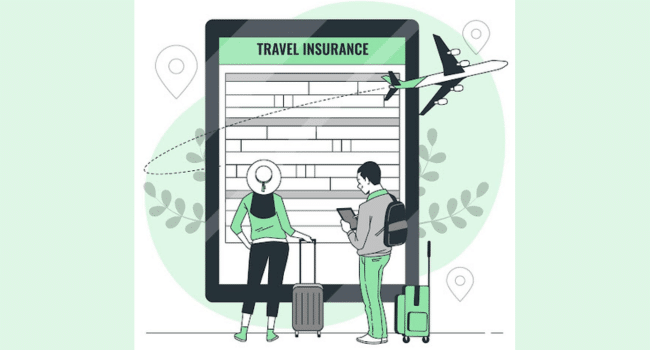Table of Contents
Going on your first international trip is a milestone. It marks the beginning of completely new experiences — exploring foreign cultures, trying unfamiliar cuisines, and stepping outside your comfort zone.
Whether you’re planning to explore the art and architecture of Europe, shop in the souks of the Middle East, or simply relax on a Thai beach, preparation is key. While most travellers spend weeks sorting out their visas, hunting for the cheapest flight deals, and drafting the best possible itineraries, they often overlook one very important aspect. Travel insurance.
In this guide, we’ll walk you through essential travel planning and why insurance should be part of your checklist from the very beginning.
Your First Trip Abroad Needs More Than Just a Passport
International travel is surely exciting, but it also comes with a fair share of unpredictability. Despite your best preparations, things can go wrong. Flights may get cancelled, baggage might be misplaced by the airline staff, or you may fall ill in a country where medical care is expensive and unfamiliar.
While you may not be able to prevent these incidents, you can protect yourself from the financial stress they may cause.
That’s where travel insurance becomes invaluable. From missed flights to stolen luggage, it will help you navigate through unfamiliar protocols as well as provide much-needed financial relief. When you buy travel insurance online, it comes with all these benefits and more.
Travel Insurance: What It Really Covers
Trip insurance is especially designed to support you when things go off-script during your carefully drafted scenes abroad. It typically covers:
-
- Medical Emergencies Abroad: Hospitalisation, accidental injury, COVID-19 treatment, and other sudden illnesses that may land you in a hospital.
- Flight Troubles: Compensation for missed connections or costs due to airline delays. It also covers flight cancellations.
- Baggage Delay, Damage or Loss: Ensures that you get reimbursement for your essentials until your bags catch up.
-
- Passport Loss or Theft: Coverage for reissuing travel documents if you lose them abroad. Also offers temporary stay in case you need to extend the trip due to the loss.
- Trip interruption or Cancellation: Refunds for non-refundable bookings if your trip is cut short due to emergencies. Same benefit if you were forced to cancel your trip before it started.
Most importantly, for Indian travellers going to Europe’s Schengen region, insurance is mandatory for visa approval. Make sure to buy travel insurance online with a coverage of at least EUR 30,000 (about INR 29 lakh) for your Schengen visa. It should also cover medical emergencies, including evacuation and repatriation.
Behind the Scenes: What Travel Emergencies Really Cost
Like all troubles, travel troubles won’t come with a warning. If you think it won’t happen to you, read on. The data says otherwise:
- 1 in 5 Indian travellers report experiencing a travel-related issue abroad
- The average cost of a minor medical emergency in Europe can cost you INR 25,000–INR 60,000 including consultation, medication and diagnostic
- Cost of comprehensive travel insurance from India: as low as INR 300 for a week
Your travel insurance is a very small cost to avoid a potentially large burden. It also comes with 24X7 emergency support that you can seek out any where in the world. From needing someone to help understand instructions in French to find out the nearest hospital which can treat your emergency, travel insurance has your back.
But I’m Young and Healthy — Do I Really Need It?
A common misconception among first-time travellers is that trip insurance is only useful for older travellers or adventure seekers. However, travel-related risks are present for everyone, regardless of age or circumstances.
Even something as simple as a stomach infection from unfamiliar food can result in hefty medical bills overseas. In countries like France or Germany, a day in the hospital can cost over INR 35,000 — and that’s not even counting medication or necessary diagnostic tests.
It’s not about expecting something to go wrong. It’s about ensuring you’re not financially vulnerable if it does.
Other Smart Travel Essentials for First-Timers
Beyond insuring your trip, here are a few planning tips that first-time travellers should keep in mind:
- Scan your passport and documents and save digital copies in your email and phone.
- Download offline maps to help navigate without roaming charges.
- Inform your bank of your travel dates to avoid credit card blocks abroad.
- Carry a basic medical kit with essentials like paracetamol, antihistamines, antacids, and band-aids.
- Buy a universal travel adapter — plug types vary across countries so confirm the type suitable for your destination.
And finally, choose a travel insurance plan that matches your destination and trip duration. It’s not just about paperwork; it’s about ensuring peace of mind.
Final Thoughts
Your first international trip is something you will remember for the rest of your life. Make sure it is memorable for all the right reasons — not for last-minute emergencies or unexpected expenses. Travel insurance is not just a requirement for many countries, it’s a smart step towards travelling responsibly. With the right plan in place, you can focus on what really matters: enjoying your journey.
So, before you zip that suitcase shut, make sure you’ve ticked this off your checklist: Travel Insurance — sorted.
